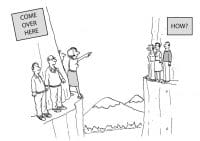
Prior to the civil war, Abraham Lincoln said “a house divided against itself cannot stand” and I believe those words are no less true today. Although the division we see in our nation has existed beneath the surface for many years, recent events have shown a spotlight on the cultural, ideological and economic divide that has engulfed our nation.
Several recent studies highlight the media as one of the most concerning elements of this national divide. The media, which has long been viewed as a natural protector of our democracy, is now seen by many as untrustworthy and corrupt. According to a recent NPR/PBS poll only 30% of Americans consider the information they are given by the media to be trustworthy. This divide becomes even more pronounced when broken down by party affiliation. According to this same poll, only 9% of Republicans view the media as trustworthy. Not since the era of “yellow journalism” over 100 years ago has the reputation of the media been so low.1
What concerns me most about these numbers is the impact it has on the perception of truth. Whether it be politics, the stock market, or any other topic, once journalists are perceived as dishonest, it becomes reasonable to disregard any information presented you don’t like or agree with as simply “fake news”. What results is a form of intellectual relativism, where absolute truth is something unattainable.
Recent psychological studies have shown that when doubt exists as to the authenticity of facts, we will naturally fall back on our feelings as the determining factor of what is true. The trouble with feelings is, due to their relative nature, they are often not shared by everyone else. Harvard Neuroscientist Joshua Greene hypothesizes that when others disagree with what we hold to be absolute, our sense of self becomes threatened. And much like when we feel physically threatened, this perceived attack on our sense of self will often cause us to counter attack. 2
I believe this is why we see an ever-growing hostility in the political arena. Rather than agreeing to disagree, or finding common ground, we label people with different points of view as either morally or intellectually deficient. We begin to be so convinced that our opinions are facts, that anyone who dares to question them becomes the enemy and must be stopped by any means necessary. Recent violence in places like Charlottesville and Berkeley is evidence, to me, that this is precisely what is happening in our nation. It must stop. As Lincoln said “a house divided will not stand.”
The question then becomes “how do we heal this great divide”? It may seem counterintuitive, but I have learned a great way to reduce my inclination to vilify those I disagree with is to regularly, and respectfully, discuss controversial topics with those very people in an appropriate setting. By doing this, particularly with people I care about, their humanity is able to cut through the talking points. It helps remind me that my opinions are simply that, opinions. And reasonable people can, and will sometimes disagree. After all, there is more we share that can bring us together than tear us apart. We just have to have the desire to focus on those things, and the courage to admit we might be wrong about some of the others.
By Luke Davis, Director, Operations & Compliance
(Past performance is no guarantee of future results. Advice is intended to be general in nature.)
2 http://www.joshua-greene.net/research/infrastructure-of-complex-thought/
